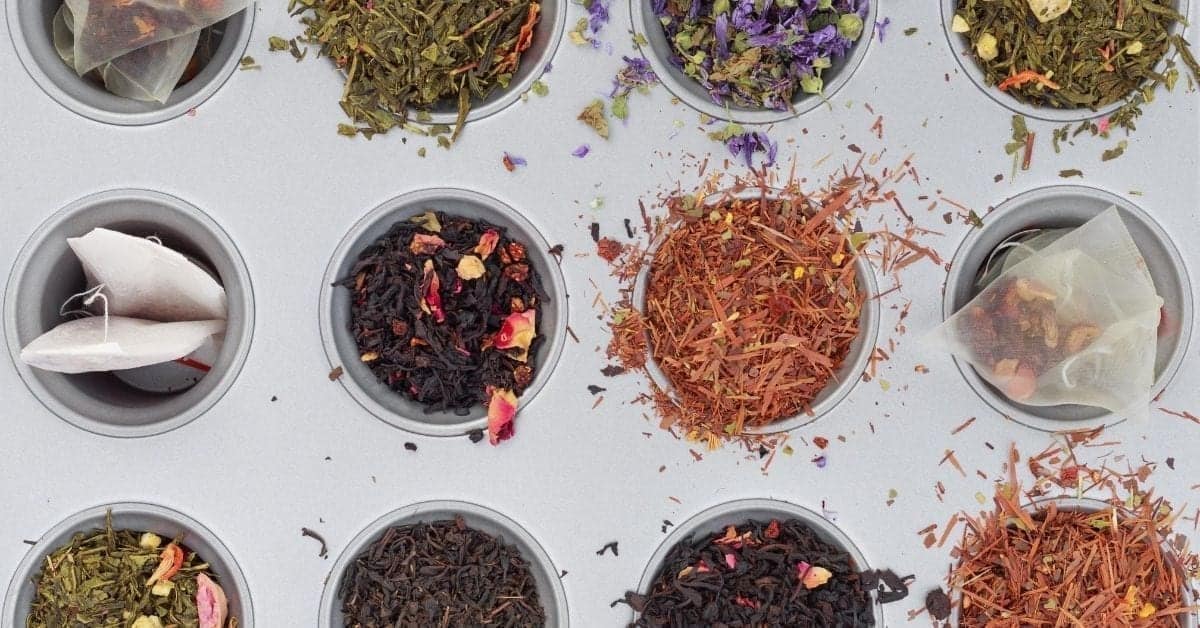Home > Emotional wellbeing > Mental health > Plant Power: The Benefits of Tea For Mental Health


My dad is fond of saying, in his lovely English/Irish way, that there is no problem a good cup of tea cannot solve. I’ve always been inclined to agree with that. In fact, the benefits of tea go are pretty remarkable, particularly for our mental health and emotions.
I struggle with my mental health and no matter how many times someone tells me exercise is great for it, I will not go on a run. As such, I am always looking for the best ways to look after my anxiety and depression in ways that suit my lifestyle, habits and overall dislike of public sweating.
There is something in the nature of tea that leads us into a world of quiet contemplation of life.” – Lin Yutang
Camellia sinensis is an extraordinarily useful plant. From the leaves, stems and roots, we can access and number of health boosting compounds and amino acids that are great for our physical and mental health. In tea, there are a few major compounds that benefit our brain functions and moods:
Caffeine and L-theanine work together really well to give us a balanced state of drive and motivation, whilst feeling calm.
Whilst we have familiarised ourselves with the benefits of tea for helping with physical ailments including, nausea, digestive issues, aches and pains and coughs and colds; drinking a cup of tea can also provide numerous mental and emotional benefits.
All in all, pretty good stuff. Furthermore, tea is affordable, easy to slide into your day/night-time routine, and, ensuring you buy from the right places, a sustainable product. So, Darlings, stock up your tea cupboards to calm, boost or relax your way to better mental health and wellbeing.
Please note: Some teas/plants can interfere with other medication and aren’t suitable for women whilst pregnant. Make sure you do any prior research or check with a doctor beforehand.
The very act of brewing and drinking tea can also have an influence on your mind. Taking the time to settle down and give yourself a rest from the stresses of everyday, is an important thing to do. Using said time to curl up with a hot cup of tea, sitting at your window, listening to music or simply closing your eyes and enjoying the peace and quiet, I think we can all agree, sounds like a terrific use of time.
Pop the kettle on, settle down, and look after yourself.
And if you still want to, go on a run, but we won’t judge you if you don’t.
Meanwhile, let us have a sip of tea. The afternoon glow is brightening the bamboos, the fountains are bubbling with delight, the soughing of the pines is heard in our kettle. Let us dream of evanescence and linger in the beautiful foolishness of things.” – Kakuzō Okakura
The exact origins of tea are somewhat muddled in history and legends, but the earliest evidence of tea was found in the mausoleum of Emperor Jing of Han in Xi’an, as early as 2 century BC. Believing to have first originated in the Yunnan Province during the Shang dynasty, tea manufacturing then spread to Sichuan before being taken to Japan by Buddhist monks. Tea held a firm place in traditional medicine before becoming a favoured beverage and held places within religious and spiritual spheres, as well as serving as a symbol of status. In the 17th century, the British began to cultivate tea in India, and it grew into a worldwide trade that remains as strong today.
My dear if you could give me a cup of tea to clear my muddle of a head I should better understand your affairs.” – Charles Dickens, Mrs. Lirriper’s Legacy

-


Dr Singh is the Medical Director of the Indiana Sleep Center. His research and clinical practice focuses on the myriad of sleep.

The role of hormones in perimenopause Throughout your menstrual cycle, you experience normal hormonal fluctuations that are responsible for proper bodily functions like ovulation and menstruation. However, once you enter perimenopause, your hormone fluctuations change. As ovaries become less responsive

What is PMS fatigue? Have you ever wondered, “Why am I so tired before my period?” If you have, you’re not alone. Around 80% of women say that they experience some PMS symptoms, including having low energy before period onset,

Understanding PMS symptoms without menstruation Before we proceed with explanations, we wanted to clarify why having PMS symptoms is not the same as being diagnosed with PMS. As we’ve already mentioned, PMS stands for premenstrual syndrome. This syndrome is diagnosed
Privacy Overview
| Cookie | Duration | Description |
|---|---|---|
| cookielawinfo-checkbox-analytics | 11 months | This cookie is set by GDPR Cookie Consent plugin. The cookie is used to store the user consent for the cookies in the category "Analytics". |
| cookielawinfo-checkbox-functional | 11 months | The cookie is set by GDPR cookie consent to record the user consent for the cookies in the category "Functional". |
| cookielawinfo-checkbox-necessary | 11 months | This cookie is set by GDPR Cookie Consent plugin. The cookies is used to store the user consent for the cookies in the category "Necessary". |
| cookielawinfo-checkbox-others | 11 months | This cookie is set by GDPR Cookie Consent plugin. The cookie is used to store the user consent for the cookies in the category "Other. |
| cookielawinfo-checkbox-performance | 11 months | This cookie is set by GDPR Cookie Consent plugin. The cookie is used to store the user consent for the cookies in the category "Performance". |
| viewed_cookie_policy | 11 months | The cookie is set by the GDPR Cookie Consent plugin and is used to store whether or not user has consented to the use of cookies. It does not store any personal data. |
